Description
Forged Gear Blanks & Crane Wheels: SEO-Optimized Guide
Forged components like gear blanks and crane wheels play a crucial role in heavy-duty industries due to their strength, precision, and durability. Forging enhances the mechanical properties of these components, making them ideal for applications that involve high stress, load-bearing, and wear resistance. In this detailed guide, we explore the process of forging gear blanks and crane wheels, their applications, and the material grades commonly used.
Forged Gear Blanks
What Are Forged Gear Blanks?
Forged gear blanks are cylindrical metal pieces that serve as the base material for manufacturing gears. The forging process involves shaping the metal under high pressure and temperature, which refines its grain structure and enhances its mechanical properties. These blanks are further machined to create precision gears used in various industrial applications.
Applications of Forged Gear Blanks:
- Automotive Industry: Used in the manufacturing of transmission gears, axle gears, and differential gears due to their high strength and reliability.
- Heavy Machinery: Gear blanks are used in heavy-duty machinery where gears must withstand high torque and load-bearing conditions.
- Aerospace Industry: Gears for aircraft engines, landing gear systems, and control mechanisms are often manufactured from forged gear blanks.
- Wind Turbines: The high mechanical strength of forged gear blanks makes them suitable for gearboxes in wind turbines.
Key Features:
- Enhanced Strength: Forging improves the mechanical properties of gear blanks, making them more durable and resistant to wear and fatigue.
- Precision Engineering: Gear blanks provide a reliable base for the production of high-precision gears with tight tolerances.
- Improved Grain Flow: The forging process aligns the grain structure of the material, reducing the risk of internal voids or weaknesses.
Forged Crane Wheels
What Are Forged Crane Wheels?
Forged crane wheels are the wheels used in cranes and other heavy-lifting equipment. These wheels are designed to support heavy loads and resist wear, even in harsh working environments. The forging process gives crane wheels superior toughness and the ability to handle dynamic and static loads effectively.
Applications of Forged Crane Wheels:
- Port Cranes: Used in cranes at ports and harbors to lift heavy containers and cargo.
- Overhead Cranes: Forged crane wheels are essential for overhead cranes used in manufacturing plants and warehouses.
- Mining Equipment: Crane wheels are used in lifting equipment for mining operations, where rugged durability is essential.
- Construction Cranes: They are employed in tower cranes and mobile cranes used in the construction of large infrastructure projects.
Key Features:
- High Load-Bearing Capacity: Forged crane wheels are designed to support extreme loads, making them ideal for heavy-duty lifting applications.
- Wear Resistance: The forging process enhances the hardness and wear resistance of the crane wheels, ensuring long-term durability in harsh environments.
- Shock Absorption: Forged crane wheels can absorb shock loads, which is critical in preventing damage during heavy lifting operations.
Material Grades for Forged Gear Blanks & Crane Wheels
| Material Grade | Description | Key Properties | Applications |
|---|---|---|---|
| Carbon Steel (AISI 1045) | A medium carbon steel with good strength and hardness | High machinability, good wear resistance, and toughness | Gear blanks and crane wheels in general engineering and automotive applications |
| Alloy Steel (AISI 4140) | A chromium-molybdenum alloy steel with high tensile strength | Excellent fatigue resistance, toughness, and wear resistance | Gear blanks and crane wheels in heavy machinery, aerospace, and construction industries |
| Stainless Steel (304/316) | Corrosion-resistant steel suitable for harsh environments | High corrosion resistance, toughness, and durability | Gear blanks used in chemical processing, marine applications, and wind turbines |
| Inconel (625/718) | Nickel-chromium superalloy for high-temperature applications | Superior heat resistance, strength, and corrosion resistance | High-performance gear blanks and crane wheels in aerospace and power generation industries |
| Tool Steel (H13/D2) | A high-hardness steel used for tool and die applications | High hardness, wear resistance, and impact toughness | Gear blanks used in die casting, forging, and high-wear industrial environments |
| Duplex Stainless Steel | Combines austenitic and ferritic stainless steel properties | High strength, excellent corrosion resistance | Gear blanks and crane wheels in marine, chemical, and offshore industries |
| Titanium Alloys | Lightweight, high-strength metal for aerospace and marine | Excellent strength-to-weight ratio, corrosion resistance | Gear blanks for aerospace and crane wheels in offshore structures where weight savings are critical |
Benefits of Forged Gear Blanks & Crane Wheels
- Superior Strength: Forged components exhibit higher mechanical strength compared to cast or machined parts, making them ideal for high-stress applications.
- Fatigue Resistance: Forging improves fatigue resistance, ensuring longer service life for gear blanks and crane wheels in demanding environments.
- Custom Engineering: Gear blanks and crane wheels can be produced in custom sizes, shapes, and materials to meet specific industry needs.
- Enhanced Durability: The forging process imparts better wear resistance and toughness, especially in applications involving heavy loads or harsh environments.
- Cost Efficiency: Forging allows for the production of high-strength components at scale, reducing material waste and machining time.






